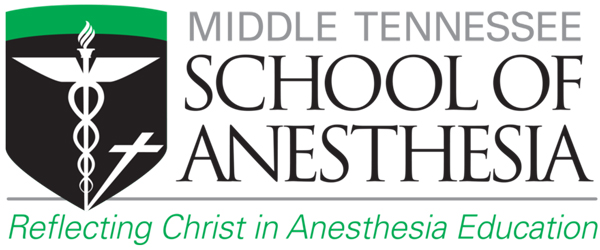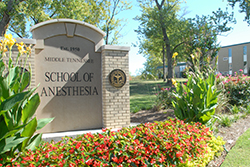MTSA faculty publish study in ‘Annals of Breast Surgery’
August 17, 2021
A research study on new recovery protocols co-authored by Stace Dollar, MS, CRNA, and John Edwards, III, MS, CRNA, was recently published in the Annals of Breast Surgery. Both serve as faculty for MTSA’s Acute Surgical Pain Management (ASPM) Fellowship and have been working toward advanced scholarship in nurse anesthesia.
Their study, Reduction in Opioid Consumption, Pain, and Anti-emetic Use: An Enhanced Recovery After Surgery Protocol for Breast Cancer Patients, tested an enhanced recovery after surgery protocol specifically designed to manage postoperative pain, nausea and vomiting among women undergoing mastectomy.
“We presented the preliminary data for this study at a couple different conferences, one in Dublin, Ireland, and the other in Dallas,” Edwards said. “Since then we developed the manuscript, submitted it and went through the review process. We’re grateful to have had the opportunity and see it get published in a peer-reviewed journal.”
Edwards was the corresponding author for the article. He said each of the authors played a different part in the research process. His role included working with the nursing research department in his facility, headed by Dorothy Brockopp, MSN, PhD, RN, FAAN; getting the writing team organized; managing the manuscripts; and bringing the project to completion with the reviewers.
“This research ties in perfectly with how we manage acute surgical pain. Being a part of the ASPM Fellowship helped make this process more manageable because we studied these cutting-edge techniques, and the Doctoral Completion program helped us learn how to prepare research for publication. So the education I’ve received at MTSA has really prepared me well for this type of work,” he added.
Edwards said he and Dollar look forward to working on future research studies. Some areas of interest include: exploring opioid disposal, drugs used to reduce bleeding during total joint replacement surgery, reducing axillary pain after shoulder surgery, and regional anesthesia techniques for a specific electrophysiology procedure.
Dollar and Edwards were recent recipients of the ASPM Fellowship “Outstanding Achievement Award,” presented at MTSA’s 2019 Commencement ceremony. Both are CRNAs at Baptist Health Lexington in Kentucky, where they co-founded and co-direct an Acute Pain Service. In addition, Edwards was the 2019 recipient of the Nevin Downs, MD Leadership Award. In 2018, Dollar received the Mary Elizabeth DeVasher Distinguished Alumni Service Award.
Walid Abou-Jaoude was the first author on the mastectomy study, with other co-authors Susan G. Yackzan, Stacy Stanifer, Martha Monroe, Barbara Self, Heather Shearin, and Thomas J. Young.
ABSTRACT
Background: Patients undergoing mastectomy, both with and without immediate reconstruction, frequently experience postoperative pain, nausea and vomiting. Enhanced recovery after surgery protocols have been designed in part to minimize these postoperative complications. The aim of this study was to test an enhanced recovery after surgery protocol specifically designed to effectively manage postoperative pain, nausea and vomiting among women undergoing mastectomy.
Methods: A retrospective cohort analysis was designed to examine the difference between patients who experienced traditional recovery after surgery (TRAS) and patients who experienced enhanced recovery after surgery regarding pain, opioid consumption, and antiemetic administration. The sample (N=204) included women undergoing mastectomy both with (n=102) and without (n=102) immediate reconstruction. No significant differences were found between these groups. Similarly, no significant differences were found related to the following sample characteristics; age, body mass index (BMI), opioid use, and pain scores on admission.
Results: Significant differences were found between groups related to pain on day of surgery (P<0.001), and postoperative day one (P<0.001). In addition, significant differences were found on both days (day of surgery P<0.001 and postoperative day one P<0.001) for opioid consumption and antiemetic administration (day of surgery P<0.009 and postoperative day one P<0.005). Mean, standard deviation, and frequency differences in the variables range from moderate to strong.
Conclusions: Results of this study among women with breast cancer undergoing mastectomy with and without reconstruction suggest that this enhanced recovery after surgery protocol can improve pain management, reduce opioid consumption, and diminish anti-emetic intake.

Stace Dollar, MS, CRNA

John Edwards, III, MS, CRNA








